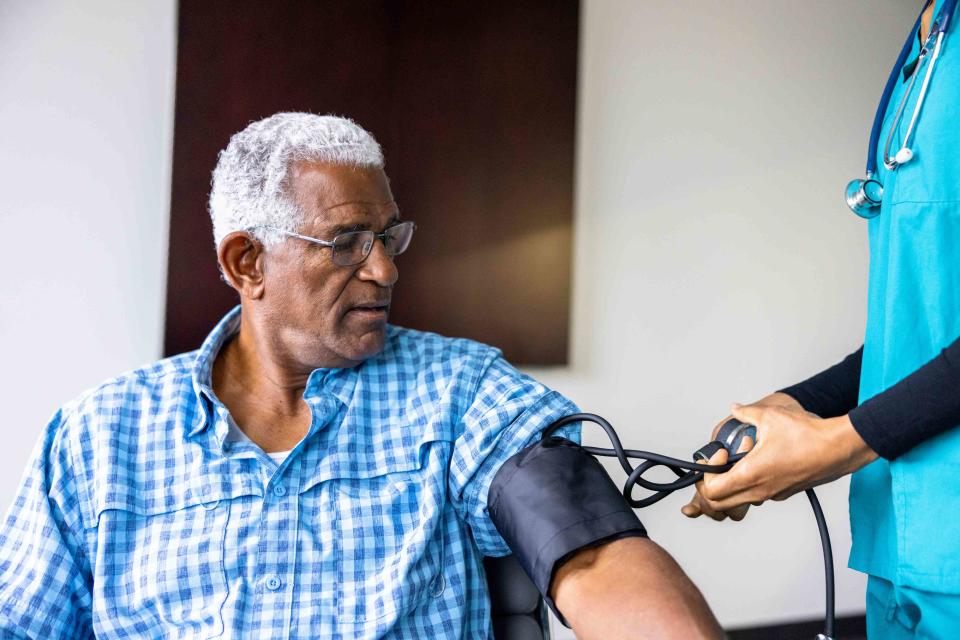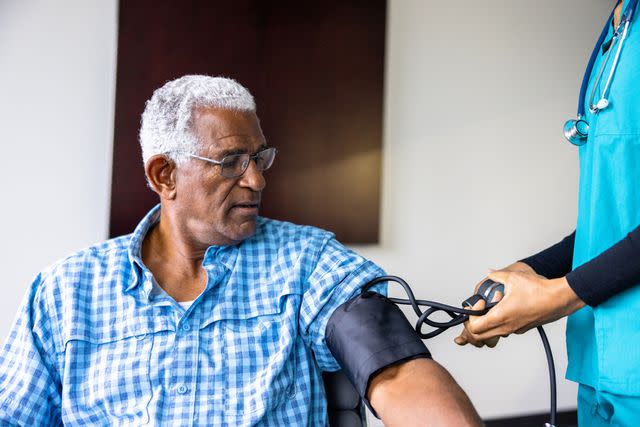What Causes High Blood Pressure (HBP)?
Sudden or Chronic Hypertension From Medication, Disease, and Lifestyle Factors

Medically reviewed by Rafle Fernandez, MD
High blood pressure, also known as hypertension, occurs when the force at which your blood pumps through your body is too high. It is measured by systolic and diastolic millimeters of mercury (mm Hg), which is how much pressure your blood puts on your artery walls when the heart contracts and rests.
A normal reading is typically 120 over 80 (120/80 mm Hg). People with certain health disorders may be at a higher risk of hypertension and can experience severe headaches, dizziness, chest pain, and more symptoms.
Many factors can contribute to risk with high blood pressure, including:
Age
Weight
Physical activity levels
Genetics
Diet
This article will discuss the various causes of high blood pressure and different risk factors.

What Causes Sudden High Blood Pressure?
High blood pressure can be sudden or prolonged. In some cases, the cause of hypertension is unknown. When that happens, it is referred to as primary hypertension. Secondary hypertension occurs with a known cause.
In the case of sudden secondary hypertension, there are several possible causes:
Acute stress
Certain medications
Caffeine intake
Drug use (cocaine or amphetamines)
These causes generally lead to a spike in blood pressure that does not last for a prolonged period.
The Caffeine and Blood Pressure Connection
Studies have examined whether caffeine raises blood pressure temporarily, but research has been conflicting. The discrepancies in studies show that some people may experience an increase in blood pressure after drinking coffee while others do not.
Related: Is High Blood Pressure Considered Heart Disease?
Causes of High Blood Pressure: Different From Risk Factors
Many people see the causes of hypertension and risk factors as one and the same, but the two are different. Risk factors are outside elements that can lead to a certain health outcome, whereas causes directly correlate with developing the health disorder.
Risk factors associated with developing high blood pressure include:
Low or no physical activity
Having obesity or being overweight
Having diabetes or chronic kidney disease
Not eating enough fruits or vegetables
Age over 40
Excessive alcohol consumption for ten years or longer
High and prolonged stress levels
Overeating salt/too much salt in your diet
Smoking cigarettes
A diet full of saturated and trans fats
Potassium deficiency
Risk Factors and You
If you fall into any risk factor category, you may be able to make some lifestyle changes to help reduce your blood pressure. Before making any changes, speak to a healthcare provider about how they may affect you and ask about the safest way to lower blood pressure.
Learn More: Can Diabetes Cause High Blood Pressure?
Conditions That Cause High Blood Pressure
Health conditions can drive secondary high blood pressure. Conditions include:
Diabetes
Chronic kidney disease or long-term kidney infections
Glomerulonephritis (kidney inflammation)
Underactive or overactive thyroid
Pregnancy
Lowering Blood Pressure During Pregnancy
High blood pressure during pregnancy can be serious. Because of that, speaking to a healthcare provider and knowing your options for lowering your blood pressure on your own while pregnant is essential. Some possible ways to lower blood pressure during pregnancy include:
Staying active as long as your healthcare provider permits it
Eating a balanced diet
Limiting or removing salt from your diet
Learn More: What to Know About High Blood Pressure and Pregnancy
Medications That Cause High Blood Pressure
Taking certain medications can also drive high blood pressure. Some possible medications known to be associated with hypertension include:
Birth control pills
Steroids
Some over-the-counter (OTC) cough and cold medicines
Herbal supplements containing licorice
Selective-serotonin-noradrenaline reuptake inhibitors (SSNRIs) antidepressants, such as venlafaxine
Should You Stop Taking Medications That Cause High Blood Pressure?
Any medication prescribed to you was done so for a reason. Because of that, taking your medication as prescribed is essential unless your healthcare provider tells you otherwise. You will likely be monitored for high blood pressure and other side effects when you begin new medications.
Related: Top 9 Vitamins That May Raise Blood Pressure
What Causes High Blood Pressure Spikes?
A spike in blood pressure occurs when your range reaches 180–200 mm Hg. Several things can lead to spikes in blood pressure, including:
Sleep: Some people experience spikes in blood pressure during rapid eye movement (REM) sleep.
Diet: Increases in blood pressure can occur after consuming foods high in sugar or salt.
Stress: High-stress situations can cause a temporary rise in blood pressure levels.
Exercise: During exercise, blood pressure spikes because the body’s demand for oxygen and cardiovascular efforts is heightened.
Is a Spike in Blood Pressure Permanent?
These instances cause temporary spikes in blood pressure that return to normal after the cause has been eliminated. For example, a spike in blood pressure caused by exercise will return to normal once you stop exercising and your heart rate returns to normal.
What Causes High Blood Pressure Without Symptoms?
High blood pressure may cause some symptoms to develop. That said, it is often referred to as the “silent killer” because many people do not experience any signs that it's occurring in their bodies. If they do, symptoms can include:
Severe headaches
Chest pain
Difficulty breathing
Nausea
Vomiting
Vision changes
Confusion
Buzzing in the ears
Nosebleeds
These symptoms are nonspecific, meaning there can be many causes, making it difficult to determine if you have high blood pressure from these symptoms alone. This is especially true if you have primary or essential hypertension. Essential hypertension develops on its own and is not driven by an underlying health disorder, so symptoms may be even less likely to develop.
How Does High Blood Pressure Feel?
You may not feel anything when you have high blood pressure, but it can cause damage to the body even if you don’t experience symptoms. That is why it’s vital to get your blood pressure tested regularly and work on eliminating risk factors in your life.
Learn More: How Often Should You Check Your Own Blood Pressure?
I Don’t Know What’s Causing My High Blood Pressure
If you monitor your blood pressure and see a consistently high level, you should see a healthcare provider. They can help run diagnostic tests and other examinations to determine what may be causing your high blood pressure and routes to lower it to safe levels.
Identifying Ideal Blood Pressure Levels
Blood pressure levels are measured by systolic and diastolic readings. Systolic is the first number and measures the pressure against an artery wall when the heart squeezes or beats. Diastolic is the second number and is the force of pressure against artery walls when the heart is at rest in between beats. Levels of blood pressure are as follows:
Normal: 120 or less systolic and 80 or less diastolic
Elevated: 120–129 systolic and 80 or less diastolic
Hypertension stage 1: 130–139 systolic and 80–89 diastolic
Hypertension stage 2: 140 or higher systolic over 90 or higher diastolic
Hypertensive crisis (medical emergency): 180 or higher systolic over 120 or higher diastolic
Read Next: How to Confidently Lower Your Blood Pressure
Summary
High blood pressure can arise for many reasons, including underlying health disorders, medications, or poor lifestyle habits. Because there is a wide array of causes, the only way to tell what is causing your high blood pressure. A medical professional will determine the cause and what you can do about it. High blood pressure can be treated in various ways, but before any therapies can begin, you must know what is causing it.

